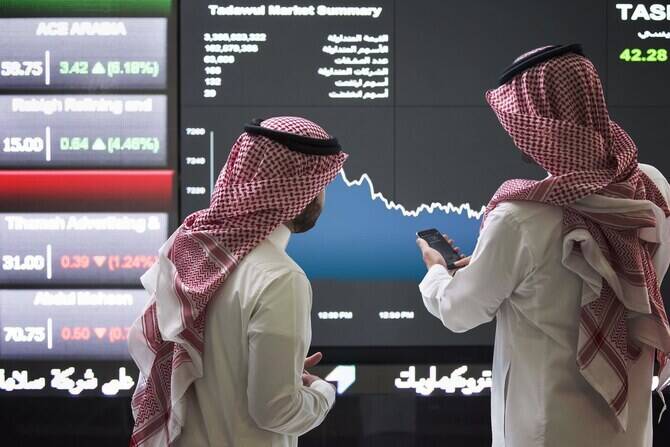RIYADH: Saudi Arabia’s stock market closed lower on Monday, with the Tadawul All Share Index falling 77.94 points, or 0.67 percent, to end the session at 11,548.66.
Total trading turnover stood at SR3.5 billion ($953.3 million), as 45 stocks advanced while 195 declined.
The Kingdom’s parallel market, Nomu, also closed in the red, shedding 340.41 points, or 1.17 percent, to finish at 28,637.78.
Of the listed stocks, 29 rose while 44 declined. The MSCI Tadawul Index dipped by 8.02 points, or 0.54 percent, closing at 1,466.51.
Alistithmar Capital REIT was the session’s top performer on the main index, jumping 9.92 percent to close at SR7.98.
Saudi Printing and Packaging Co. followed closely, gaining 9.86 percent to reach SR12.70. Nice One Beauty Digital Marketing Co. also saw notable gains, rising 4.78 percent to SR38.35, while Zamil Industrial Investment Co. climbed 3.92 percent to SR38.40.
On the other end of the spectrum, Dar Alarkan Real Estate Development Co. posted the steepest decline, falling 5.51 percent to SR22.30. Eastern Province Cement Co. dropped 4.48 percent to SR34.10, and Riyadh Cables Group Co. slid 4.26 percent to SR126.
National Gypsum Co. announced a 22.03 percent year-on-year increase in revenue for the fiscal year ending December 31, 2024, reporting SR63.32 million compared to SR51.89 million the previous year. Despite the rise in sales, the company posted a net loss of SR14.72 million, reversing a profit of SR5.13 million a year earlier.
The loss was attributed to higher sales costs and a decline in other income, including a SR10.7 million fine paid to the General Authority for Competition and the absence of land compensation income that had been recorded the prior year. Shares of National Gypsum Co. dropped 1.59 percent to settle at SR19.80.
Banque Saudi Fransi reported a 16.38 percent increase in net profit for the first quarter ending March 31, 2025, reaching SR1.34 billion compared to SR1.15 billion in the same quarter of the previous year.
The bank’s total operating income rose 13.17 percent year on year to SR2.64 billion, driven by increases in special commission income and trading income.
Net income growth was supported by an 8.1 percent rise in net special commission income, while operating expenses grew by 12.16 percent. Total comprehensive income more than doubled to SR1.92 billion, up 120.85 percent from the same period last year. The bank’s share price rose 0.92 percent to SR17.50.
Riyad Bank posted a 19.39 percent year-on-year increase in net profit for the first quarter of 2025, reaching SR2.49 billion compared to SR2.07 billion in the same period last year.
Total operating income grew 10.18 percent year on year to SR4.5 billion, while total comprehensive income increased by 23.62 percent to SR2.68 billion.
The bank attributed the rise in profitability to growth in net special commission income, trading income, exchange income, and net fee and commission income.
Operating expenses fell due to lower impairment charges for credit losses and other financial assets, though this was partially offset by higher employee and premises-related costs. Despite the strong earnings, Riyad Bank’s share price slipped 0.82 percent to SR30.15.





















